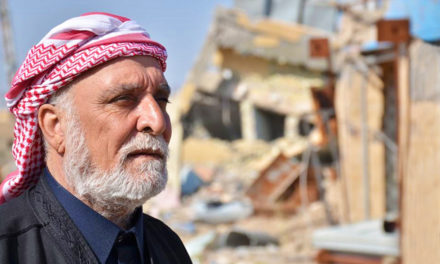The unexpected election of Donald Trump invoked a largely subdued response from Iraqis. Over the past six weeks, the nation has been preoccupied with developments in Mosul as Iraqi forces battle it out to recapture the last major ISIS stronghold in the country. Through conversations with Iraqis in Baghdad about what Trump’s election might mean for Iraq and its relationship with the United States going forward, it is clear that unlike Hillary Clinton, Trump is a largely unknown quantity. There are however some common themes that arise in any conversation about what to expect from a Trump White House and the sorts of priorities that Iraqis envisage from his administration.
Despite a noticeable upsurge in the international coalition’s contribution to countering ISIS over the past 12 months, many Iraqis remain cynical about the United States’ commitment to defeating the transnational terrorists. Part of this cynicism stems from the impression that the United States was too slow to offer support to Iraq when Mosul first fell to ISIS in June 2014. Conspiracy theories are widespread and people’s views range from “the US isn’t doing enough,” right down to “America is supporting Daesh”. There is a sense though that the election of Donald Trump may provide an opening for the US to flex its military muscle. Despite suggestions that Trump is an isolationist, Iraqis still consider Republicans to be more hawkish than their Democratic counterparts. Trump has made some outlandish statements about how he intends to “bomb the hell out of ISIS”, but there is a view among Iraqis that he means what he says in this regard. How that will play out in reality is anyone’s guess. Calls for US combat troops to return to Iraq are even less popular here than they are in the US. What is far more palatable though is the idea that our two countries need to strengthen the military relationship by reinforcing arms transfers, intelligence sharing and air cover. Iraqis are also cautious about how Trump intends to deal with the civil war in Syria given its direct impact on the security situation in Iraq.
While there is little agreement on the extent of America’s military footprint in Iraq, there is broad agreement about the need to boost economic ties. As one friend put it (rather hyperbolically), “We don’t want them to occupy us militarily, but let them occupy us economically”. Since the collapse of oil prices in 2014, Iraq has found itself struggling to make ends meet. Since February this year, the government has implemented a hiring freeze and with a weak private sector; young Iraqis are acutely feeling the impact on their future. Many now speak about the importance of reducing Iraq’s dependence on oil and diversifying the economy. American investment is seen as an opportunity to kick-start the economy and provide much-needed jobs. In this regard, several Iraqis spoke about Trump’s business credentials and expect that any future engagement would feature greater emphasis on furthering mutual economic interests beyond the oil sector.
It is that pragmatism that Iraqis readily identify with the incoming president. A case in point is Trump’s outlandish claim that he would seize Iraqi oilfields as a means to compensate America for all the blood and treasure it has shed since the invasion. No one that I spoke with believed that he would (or even could) follow through with that pledge. Perhaps it is because Iraqis see in Trump many of the attributes that their own politicians exhibit, but there is an understanding that Trump’s campaign rhetoric may not necessarily translate into actual policies.
While many of his most important domestic policy positions went unnoticed in Iraq, including his pledge to repeal Obamacare, build a wall with Mexico, and take a tough stance with China, Iraqis, like many in the Middle East were outraged by Trump’s position on immigration including the proposed ban on Muslims entering the US. One friend was concerned that more stringent immigration policies would deny him the opportunity to pursue higher education in the US. What didn’t go unnoticed though was Trump’s calmer demeanor during his acceptance speech. That seems to have reassured some that once in the Oval Office, Trump would adopt a more “presidential” posture.
Yet despite concern about what many see as outright Islamophobia, some Iraqis suggested that perhaps Trump’s views towards Muslim extremists would spur him on to take a much tougher stance towards Iraq’s neighbors, who are often blamed for encouraging the rise of Salafi Jihadist groups. There is no consensus on how much America should be engaged in the region, and depending on who you ask, the US should either “stop meddling” in the Middle East or exert far more energy into curtailing the ambitions of its allies in Turkey and the Gulf.
Whatever degree of engagement the Trump administration eventually chooses in the Middle East, any suggestion that the US would favor a partition of Iraq will not go down well in Baghdad. As Iraqi forces inch their way into Mosul, there is a palpable sense of renewed optimism about the future of a united Iraq. Ask any Iraqi what they know about Joe Biden, and they’ll tell you how he wanted to break up the country. Iraqis are still sizing up President-elect Trump, but by the time he assumes office in January, it will be incumbent on him and his administration to prepare the American people and the people of our region for what he has in store for the world.

Ali Al-Mawlawi
Ali Al-Mawlawi is head of research at Al-Bayan Center, an independent think tank based in Baghdad. He can be reached on ali[at]bayancenter.org










